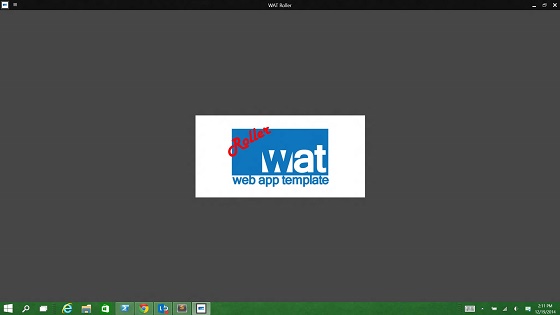Taking the Web App Template Cross-Platform
If you are a Web developer and are thinking about taking the jump to mobile apps, the Web App Template (WAT) is an awesome way to get started. Creating mobile apps doesn’t get much easier than this, and the approach is lined up with the approach a lot of top companies are taking across Android, iOS and other platforms.
Ever since we released the WAT earlier this year, we’ve heard a lot of really great feedback, and developers have started submitting apps to the Windows and Windows Phone stores that they built on top of their existing Web investments.
In the meantime, we’ve been busy working on some new tools that expand the capabilities of the WAT and make it even easier to bring your Web investment into a Windows universal app. If you’re a Web developer looking to transform your work into Windows apps, look no further.
For example, one of the greatest things about the Web is that it’s cross-platform, so we’re extending the WAT tool to be cross-platform as well, starting with the release of the Android version of the WAT.
The Android version works just like WAT 1.0 did for Windows. You can take the same config file you built for your Windows WAT app and drop it into the Android version of the tool. This can help your fantastic website reach even more users. iOS hasn’t been forgotten — we’re working hard on that and planning to release our iOS version sometime soon.
WAT Roller
It’s no secret that some Web developers aren’t using Windows as their main machine, but for testing purposes, building a hosted app on Windows has always required that the Web developer have a Windows machine or VM running Visual Studio. To make things easier, we’ve built a Windows Store app called WAT Roller.
The WAT Roller allows you to point the app to a WAT config file you have hosted on a website.
The WAT Roller app will then re-launch as your hosted app …
allowing you to make changes to your config file …
and see the changes reflected directly in the test app …
after pointing the app to the new config.
Once the app is installed, it’s as easy as:
1. Clicking on Settings and selecting Change Config Host Address
2. Pointing the WAT Roller to your Config file on a Web server and
a. Refreshing the app to pick up changes you’ve made OR
b. Resetting the WAT Roller back to its original state.
Now, getting off the ground is even easier. All a developer needs is a test device or VM and this app, which is free in the store. And Web developers can use their integrated development environment of choice. The WAT Roller is available for Windows, Windows Phone and Android.
New Features in WAT
As well, we’ve added some new features to the WAT based on feedback from Web developers who have used the tool. All of the features are implemented in version 2.2 and later of the Windows tool. Here are some highlights:
- W3C Manifest for Web App - We have added support for the developing spec for the Manifest for Web Apps. You can now build the config file with this standard and render your WAT app. This version of the format is also supported in the Android version. And don’t worry, your legacy config files will still be supported.
- Hosted App Files -You can now host your config file, app CSS and app JavaScript files on your website and point to them from within your store app. This allows you to easily update these assets without doing a store release. You can also coordinate changes between your website and your store app, as all the changes can now be pushed from the same location.
- Faster Page Loads - We’ve worked on the transitions from page to page to make sure the app is as responsive as possible so your performant websites are performant apps as well.
- Support for Globalization - Globalization is now built directly into the WAT tool so that language support is easy. If you’re using non-Latin characters or supporting multiple languages in your website, you can replicate that experience with your store app.
- SuperCache 2.0 - We’ve revamped the offline caching solution we call SuperCache. This new version supports more use cases and allows you to extend the proxy to support the edge cases.
And for app builders who are not as familiar with the code, our app builder tool, Windows AppStudio Beta, now constructs Universal WAT apps as well.
We’re excited about the new apps we’re seeing in the market and the feedback we’re getting on the WAT tools. Keep the feedback coming, and we’ll continue to make WAT better.




